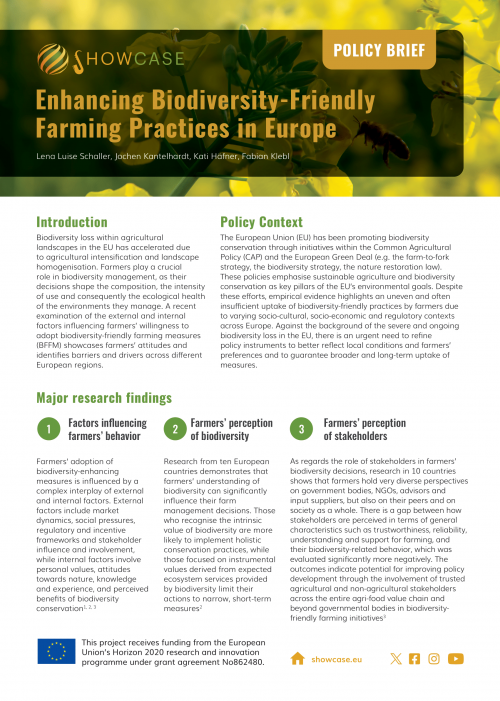SHOWCASE's third and most recent policy brief sheds light on how Europe can more effectively promote biodiversity-friendly farming practices (BFFM) and what drives or hinders farmers’ willingness to adopt them.
Authored by project partners BOKU and ZALF, the brief draws on research conducted across ten European countries, analysing the social, economic and psychological factors that shape farmers’ decisions about biodiversity management.
Despite strong EU-level commitments through the Common Agricultural Policy (CAP) and the European Green Deal, including the Farm to Fork and Biodiversity Strategies, the uptake of biodiversity-friendly measures remains uneven. The findings reveal that farmers’ decisions are influenced by a complex interplay of internal and external factors — from personal values and perceptions of biodiversity, to economic pressures, social norms and trust in institutions and stakeholders.
The brief highlights that farmers who value biodiversity for its intrinsic importance, rather than solely for the ecosystem services it provides, are more likely to adopt holistic, long-term conservation practices. Meanwhile, perceptions of bureaucracy, underpayment or lack of societal support often discourage implementation.
To address these barriers, the policy brief proposes three key recommendations:
- Tailored incentive programmes: Design flexible, regionally adapted agri-environment schemes that combine co-design, result-based payments and collective approaches.
- Enhanced stakeholder involvement: Strengthen collaboration and trust between farmers, advisors, NGOs, researchers and policymakers throughout the agri-food value chain.
- Promotion of holistic biodiversity views: Encourage farmers to recognise biodiversity’s intrinsic value through targeted information campaigns and advisory services.
By refining policies to better reflect local realities and farmers’ perspectives, the brief argues, Europe can make meaningful progress toward halting biodiversity loss and fostering nature-positive farming systems.
Read the full policy brief here.
